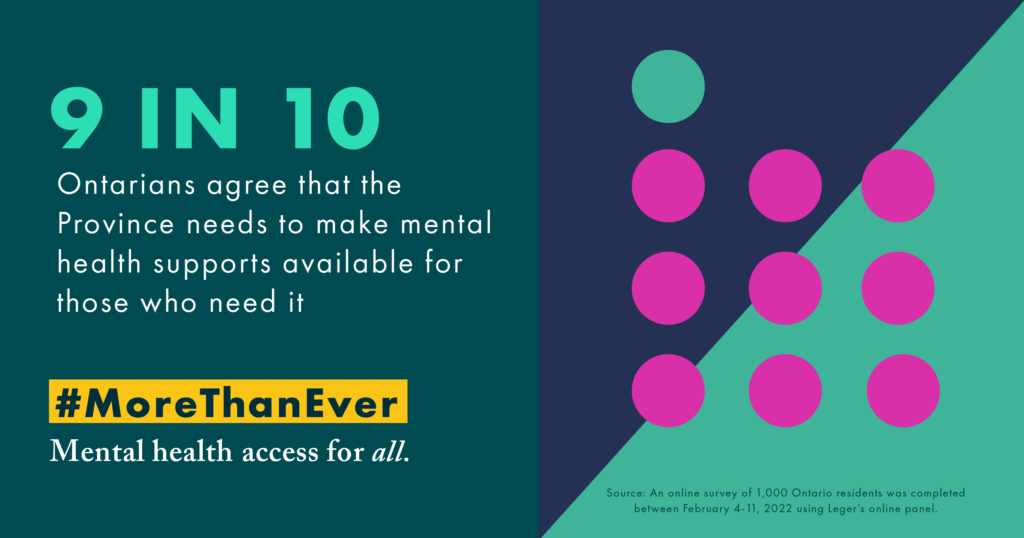OASW study: Eighty per cent of Ontarians think mental health support vital to move past the pandemic, but less than one-third feel supports are accessible
TORONTO, March 7, 2022 /CNW/ – A survey, commissioned by the Ontario Association of Social Workers (OASW) and released today in honour of Social Work Week (March 7-13), reveals four-in-ten (38%) Ontarians report their mental health was negatively impacted in the past year, with 14% reporting that supporting a friend or family member experiencing declining mental health has impacted their own mental health. The survey also revealed eight in ten Ontarians think mental health support is vital to move beyond the pandemic, but less than one third feel supports are accessible.
“We know the pandemic’s mental health effects on children and long-term care residents, but the shock waves for adults, caregivers, families and workers are also real and far-reaching,” says OASW’s Chief Executive Officer, Deepy Sur. “Whether you call it an echo or parallel pandemic, we’re in the midst of a mounting crisis, and it’s imperative that we make mental health and addictions supports available for Ontarians reporting the greatest mental health declines, and for those struggling with impacts on work.”
The survey conducted by Leger revealed:
- Eight-in-ten who mention that a family member has experienced a mental health decline or crisis within the past 12 months say the family member was an adult aged 19+ (82%), as compared to a child (4%) or teen (12%). Five per cent of all respondents reported that a family member experienced a mental health crisis that required urgent care in the past year.
- Younger Ontarians (<35 years old), women, and those with children under age 18 in the home, are significantly more likely to have seen a downward shift in their family’s mental health in the past 12 months. Those whose own mental health has been impacted in a negative way are significantly more likely to say their family has been likewise affected (58%).
- Twenty-one per cent have encountered struggles with employment due to mental health concerns over the past year, including leaving their job (9%). Others have taken a short-term leave of absence from their job (5%), struggled to find employment (4%), or resigned from their job (3%) due to a mental health concern. Those who had contemplated or taken one of these steps are significantly more likely to be younger (aged 18-34), say their mental health has declined over the past year, or identify as an ethnicity other than Caucasian.
- While just over half (54%) say they have access to an employee benefits plan, only 1 in 3 (36%) report having access to a plan that includes coverage for mental health supports.
- The majority agree that residents in long-term care homes have had their mental health negatively affected by the pandemic (84%), and eight-in-ten (80%) believe more mental health supports are required for residents in long-term care homes.
- The majority agree that school aged children and youth have had their mental health negatively affected by the pandemic (80%), and that more mental health supports are required (80%).
- Ninety per cent of Ontarians agree that mental health supports should be available to those who need it and 84% agree access to mental health supports is vital for Ontario to move past the pandemic and ensure the province’s economic recovery. Only 28% feel mental health supports are easy to access.
“Achieving the level of mental health access needed to support Ontario’s recovery will take everyone, including employers, funders, policy-makers, and the over 20,000 social workers across Ontario. Social workers’ efforts toward building resiliency, optimism, and hope were critical before the pandemic. They’re even more so now,” adds Sur.
Together with its members, OASW is asking the provincial government to accelerate already-committed mental health and addictions funding, unrolling it over five years rather than 10.
As the largest provider of mental health supports in Ontario, social workers are vital to ensuring mental health access for all Ontarians. In health care, long-term care, schools, community mental health, private practice and more, social workers are there to intervene early, reduce barriers, and deliver the quality of mental health care that individuals, families, and communities need, now more than ever. In fact, 86% of Ontario residents believe social workers are essential service providers, and that the pandemic has increased the importance of social workers as providers of mental health supports (79%).
“The pandemic put a spotlight on the essential role of social workers. We’re inviting Ontarians to join us in recognizing social workers’ dedication to their mental health and well-being. It’s also an opportunity for us to underscore that more than ever, people need more mental health supports and they need them sooner.”
ABOUT OASW
The Ontario Association of Social Workers (OASW) is the voice of social work in Ontario. It is a voluntary, provincial, non-profit association representing over 8,000 members. All members have a university degree in social work at the bachelor, master, or doctoral level. OASW works to actively speak on behalf of social workers on issues of interest to the profession and advocates for the improvement of social policies and programs directly affecting social work practice and client groups served.
About the Leger Survey
An online survey of 1,000 Ontario residents was completed between February 4-11, 2022, using Leger’s online panel, LEO. Leger’s online panel has approximately 400,000 members nationally and has a retention rate of 90 per cent. A probability sample of the same size would yield a margin of error of +/- 3.1 per cent, 19 times out of 20.
Poll aggregator 338Canada.com gave Leger the highest rating among all polling firms in Canada for the accuracy of its studies. See https://338canada.com/pollster-ratings.htm.
For further information, please contact:
Gabby Nobrega
gabby@breakthroughcommunications.ca
416.930.9756
SOURCE Ontario Association of Social Workers
